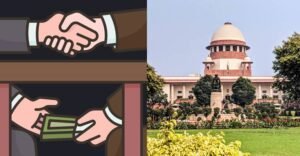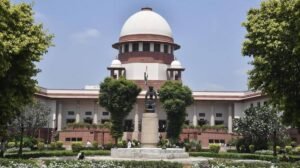The Supreme Court on Monday (March 4) held that legislators do not enjoy immunity from criminal prosecution for bribery charges in connection with their speech and votes made in Parliament and Legislative Assemblies.
In doing so, it overruled its own 1998 judgement in P V Narasimha Rao v State (CBI/Spe), where a five-judge bench, in a 3-2 verdict, held that legislators were immune from prosecution for taking such bribes.
A no-confidence motion, and allegations of bribery

Amidst economic and political upheaval in the country, CPI(M)’s Ajoy Mukhopadhyay, on July 26, 1993, introduced a no-confidence motion in the Lok Sabha against Prime Minister P V Narasimha Rao.
At the time, Rao’s Congress party, with 251 members of parliament (MPs), was 13 short of a majority in the 528-member-strong Lok Sabha. On the day of the vote, however, the motion was defeated with 265 votes in favour, and 251 against — Rao and Congress, thus, stayed in power.
The Supreme Court has overturned its own order granting immunity to MPs and MLAs under their privileges in bribery cases.
The court has clearly said that taking bribe destroys probity in public life. The Constitution bench of seven judges of the Supreme Court gave this decision unanimously.
CJI Chandrachud overturned Narsimha Rao Government vs State Judgement

The bench was headed by Chief Justice DY Chandrachud The latest judgment followed the 1998 case ‘PV Narasimha Rao vs. State’.
The previous decision of the Supreme Court given in the case has been overturned.
The case was about public representatives taking bribes for giving speeches and casting votes inside the House. In 1998, the court had ruled that MPs and MLAs could not be prosecuted for taking bribes in such cases because they were protected by parliamentary privilege.
But in the latest decision the Constitution Bench has said that the old decision was wrong.
SC Bench refers Articles regarding this Case

According to the bench, under Articles 105 (2) and 194 (2) of the Constitution, the freedom given to public representatives to do and say something inside the Parliament and Legislative Assemblies is related to the collective functioning of the House. MPs get privileges under Article 105 (2) and MLAs get privileges under article 194 (2).
The court said that these privileges must be related to the basic functions of public representatives and taking bribe does not come under this privilege.
In which case the decision came? The bench clearly said that ‘Narasimha Rao’ The decision given in the case is very dangerous and hence it is rejected. The case in which the latest decision came is called ‘Sita Soren vs. Union of India’.
Sita Soren vs Union of India

Sita Soren elder sisters in law of former Jharkhand chief Minister Hemant Soren she was accused of taking bribe to vote for a particular candidate in the 2012 election for a Rajya sabha seat.
She was MLA of Jharkhand Mukti morcha at that time. After receiving the complaint regarding the matter the Election commission of India had cancel the election in which she fought.
Later CBI investigated and filed charge sheet against her, after that she was a arrested and also spend 6 months in jail reportedly right now she is out of jail.











Comments 2